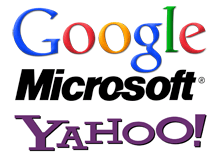Even If Yahoo Wants To Leave Microsoft, Here’s Why It Can’t
Despite effectively renewing its search deal with Microsoft recently, the Wall Street Journal is reporting that Yahoo wants a way to break that deal. Why didn’t Yahoo take the opportunity it just had? I suspect that technically and financially, it couldn’t. Yahoo’s “Get Out Of Microsoft Free” Card The WSJ story says that Yahoo has […]

Yahoo’s “Get Out Of Microsoft Free” Card
The WSJ story says that Yahoo has been “quietly” trying to find a way out of its deal with Microsoft. There are some very specific reasons why Yahoo could break that ten year deal early. One of them is the failure for Microsoft to help Yahoo to reach promised “revenue per search” or RPS goals.
Those RPS goals have never been met. That’s part of the news that came out today, that Microsoft has extended for a second time a guarantee to make up for the shortfall caused by not reaching those goals.
Why didn’t Yahoo just take that failure as the “get out of Microsoft free” card that it seemed to offer? From the WSJ story, we have this:
Yahoo is unlikely to get out of its contract with Microsoft until at least mid-2015, the midway point of the 10-year agreement, when either party can potentially opt out, said a person familiar with the contract.
There is another clause in the deal that allows Yahoo to sever it if the revenue per search falls below a certain level, but the revenue per search has been rising and doesn’t appear likely to fall below that level, this person said.
How Low Does RPS Have To Go?
It’s hard to understand how RPS is so low that Microsoft has to pay a guarantee, but not low enough to allow Yahoo to terminate the contract. To understand more, let’s go to the terms of the agreement, specifically about termination:
Yahoo! may terminate the Search Agreement if the trailing 12-month average of the RPS in the United States (the “U.S. RPS”) of Yahoo! and Microsoft’s combined queries falls below a specified percentage of Google Inc.’s (“Google”) estimated RPS measured on a comparable basis or if the combined Yahoo! and Microsoft query market share in the United States falls below a specified percentage
Note the part I bolded. Yahoo has been doing things to boost RPS for the few areas of search ads that it controls, as opposed to the search ads it carries from Microsoft. It may be that the higher Yahoo RPS, combined with lower Microsoft RPS, might keep the overall RPS high enough to prevent Yahoo from acting on the termination clause but still low enough to cause Microsoft to pay guarantees.
My separate article on Marketing Land today gets into this whole RPS issue in more depth:
Why Yahoo Can’t Leave Quickly: No Tech & Short-Term Cost
Maybe that’s the reason. A more likely reason, in my view, is that Yahoo simply can’t leave Microsoft yet.
Yahoo has no substantial Web search technology left. It gave that up as part of the deal with Microsoft. Drop Microsoft, and Yahoo would have to quickly find a Web search partner to power the bulk of its listings that are so very important to a major search engine. Google is the only real choice, and Yahoo might not be able to go to Google without regulatory approval.
That leads to the financial hurdle. While Yahoo waits on an approval process, it also has little search ad serving technology left. That also was largely handed over to Microsoft. Even if Yahoo could go without Web listings, it would still be stuck having to redevelop search ads — taking a loss until that was done.
Bottom line? I’m sure Yahoo is quietly seeking alternatives to staying with Microsoft but also quietly doing it because it’ll take time to extricate itself from Microsoft in a way that won’t be costly in the short term.
Related Articles
- The Microsoft-Yahoo Search Deal, In Simple Terms
- What’s Yahoo’s “Plan B” For Search?
- Ironically, Search Might Be Less A Priority At Yahoo As Google’s Marissa Mayer Takes The Helm
- As The Yahoo-Microsoft Search Alliance Falls Short, Could A Yahoo-Google Deal Emerge?
- Eric Schmidt Floats Idea Of A Yahoo-Google Search Partnership
- A Yahoo-Facebook Search Partnership? Reality Check Time!
- Yahoo Extends Microsoft Search Deal & Revenue Guarantees
- Why Yahoo Will Never Reach The “Revenue Per Search” That Microsoft Promised
Opinions expressed in this article are those of the guest author and not necessarily Search Engine Land. Staff authors are listed here.
Related stories